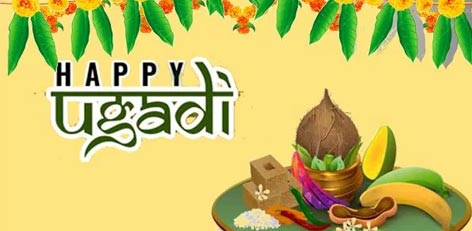Significance of Ugadi
Posted on: 18/Mar/2018 12:02:12 PM

The people from Tamil Nadu celebrate the Tamil New Year’s Day, mostly on 14th April. However, the people from the states of Andhra, Karnataka, and Telangana celebrate their new year, known as Ugadi,
The same day is also celebrated in some part of the country as ‘Gudi Padwa’ and the Sindhi people celebrate it as ‘Chethi Chand’.
The term Yugadhi is a combination of 2 words – Yugam, meaning millennium or millions of years and Aadhi, the origin. Thus, Ugadi means the commencement of a new yugam or millennium (millions of years). The mythological classic, Brahma Puranam, informs that Lord Brahma Deva created the world on the 1st day of the calendar month called ‘’Saithra’. Further, the 1st day of Saithra also marks the start of the Spring Season and thus, it assumes additional significance.
Ugadi is generally celebrated during either March or April. As per the Hindu calendar, Ugadi is the 1st-day of the Hindu calendar month called ‘Saithra’ (‘Chithirai’ in Tamil), Ugadi falls on the next day’s Pradhama period after the New Moon Day (Amavasya) in the calendar month of Panguni. The festival is strictly celebrated only the next day after the New Moon Day.
This year (2018), Ugadi is celebrated on 18th March (Sunday). This day is considered to be auspicious to undertake new ventures in life. The people from the states of Maharashtra, Kannada, and Andhra follow the Lunar System in celebrating their important festivals.Their calendar month, in fact, starts the 1st day after the New Moon day (called Prathama). This Ugadi also falls on the Prathama day.
However, the people from the states of Tamil Nadu and Kerala follow the Solar system while celebrating their festivals.
On the day of Ugadi, people follow the tradition of getting up early in the morning, taking an oil bath, wearing new clothes, and then offering prayers to God.
Special dish, known as ‘Ugadi Pachadi’ is prepared on this day. This contains all the 6 tastes - sweet, hot, bitter, sour, saltiness, etc. This has the ingredients of jaggery, neem flower, the sourness of raw mango, the sourness of tamarind, chilli, and salt.
It is worth noting here that the people from Tamil Nadu also make this same dish while celebrating Tamil New Year’s Day. This dish and taking it signifies that human life is a mixture of all varieties of emotions/experience such as happiness, sorrow, bitterness, etc just as the dish reflects the different tastes.
The people originating from Andhra who have settled in Tamil Nadu also celebrate Ugadi in a grand manner. There are a number of entertainment events and awards functions on this day including music, dance, drama, etc.
Just like the Tamil New Year’s Day, the Telugu New Year’s day is also celebrated as per the Hindu Almanac (Panchangam).
Panchangam or the Hindu Almanac is full of information regarding the future, blessings of the gods, the welfare of the people of the world, while specifying the 5 features of each day’s Thithi (date/day as per Hindu calendar, week, star. The yogam (prospects), and karanam).
On the day of Ugadi (Sunday, 18th March), special prayers are being performed in all the temples in Andhra and Telangana. Ugadi is celebrated in a grand manner in the famous temple town of Tirupathi. The temple is adorned and decorated with flowers and electric lights. The temple is cleaned with scented materials.
‘Alwar Thirumanjanam’ will be performed on the on the main deity of the temple, Lord Venkateswara. The deity will be adorned with a dress made of pure silk and along with His Consorts Sridevi and Bhoodevi, will be taken to the place near the temple golden gate where special ‘Aaradhanas’ will be performed and the reading/chanting of the almanac (panchangam) is done.
In order to have a darshan of this rare event, lakhs of devotees from all over India gather at the famous Tirupathi temple.







